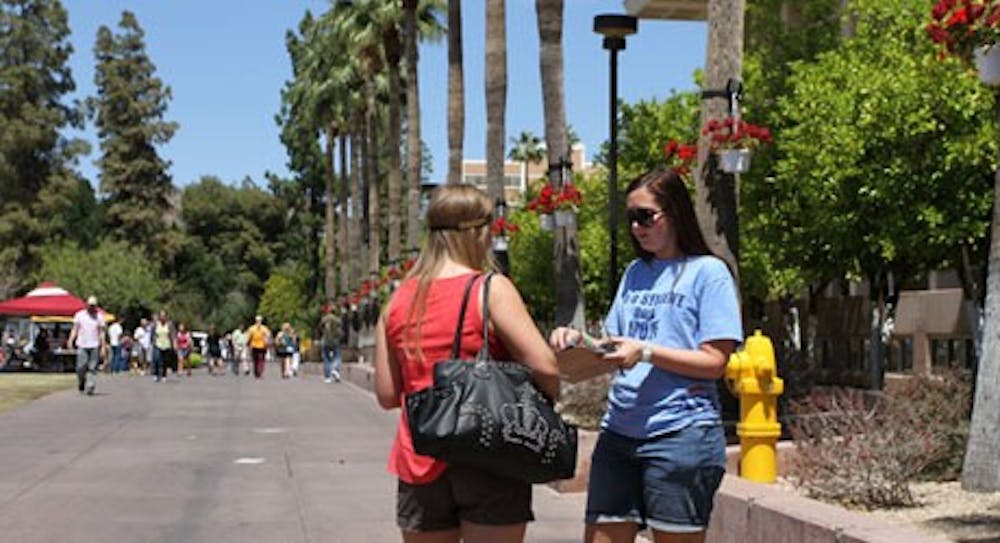The Arizona Students’ Association is organizing events across campus to educate students about Proposition 100 and the effects of the potential sales tax increase.
Students who registered will be able to vote on the issue on the Tempe campus starting April 26.
If passed, Proposition 100 will impose a temporary one-cent sales tax. The language of the proposition mandates that two-thirds of the revenue go to primary and secondary education, while the remaining one-third will go to public safety, health and human services.
The tax revenue will allow the state Legislature to continue funding the universities as it has been, but if the proposition fails, the Legislature has said the universities could face an additional $107 million cut.
ASU will take about $48 million of those cuts if the measure fails, said Robyn Nebrich, interim executive director of ASA.
USG president Brendan O’Kelly said the student government has been working to promote awareness about the May election because most students expect voting to occur in November.
“We’re trying to get students to register right now so they can vote early on,” he said.
USG members have stationed themselves outside of the Memorial Union on the Tempe campus since last Monday, registering students to vote or encouraging them to go online to register. Following registrations, students will be able to vote at an early polling location at Palo Verde West starting April 26.
“The information has been getting out there,” O’Kelly said. “One in five students who log in [to myASU] will see a banner on the screen encouraging them to vote, and we sent an e-mail out to every student with the link to register.”
While USG is working to get all students registered to vote, ASA’s “Yes on 100” Campaign has been educating students about the potential ramifications of Prop 100.
Over the last week, ASA’s Proposition 100 “blitz week” has taken place across the ASU, NAU and UA campuses, culminating with a rally at Central High School on Saturday. About 800 people attended the rally, according to ASA officials, coming from all over the state to show their support of Proposition 100.
“One of the most effective ways to run a campaign is to have one week where you have concentrated efforts and high visibility on the campuses,” Nebrich said. “The number of people you’re able to contact skyrockets.”
ASA held events at ASU last week to promote the proposition, including an ‘80s-themed party near the MU, and canvassed Tempe neighborhoods and ASU dormitories — all in an effort to educate voters about the importance of Proposition 100.
“We have such a short timeline with the campaign, so we wanted to have a really big week to get everyone talking about [Proposition] 100,” Nebrich said.
ASA members said they need to convey the importance of education to voters in a state that is currently ranked 35th in the nation for investing in higher education.
“There’s a statewide committee running the student effort behind the ‘Yes on 100’ Campaign,” said Levi Wolf, co-chair of ASA’s Yes On 100 Campaign committee.
Wolf, a geography and political science freshman, is responsible for coordinating the campaign on the ASU campuses, as well as working with UA and NAU coordinators.
“Essentially, what we’re really pushing is the fact that if Prop 100 doesn’t pass, ASU is going to lose $48 million,” Wolf said. “It’s easy to get kids interested in [the campaign] by telling them the effects of what happens if [Proposition] 100 doesn’t pass.”
O’Kelly stressed the outcome of Proposition 100, saying that its passage is vital to the universities in their current state.
“If [Proposition] 100 passes, tuition is not going down at all,” he said. “If it doesn’t pass, we will see a drastic change in the operation of all universities.”
Former Associated Students of ASU West President Andrew Clark said he does not support Proposition 100, as his former fellow ASA board members do.
“I think everybody wants to have more money in education,” said Clark, who is the state chair of College Republicans. “However, whether we get this passed or not, there’s no guarantee for anything here.”
Proposition 100 is a short-term solution for a long-term issue, Clark said.
O’Kelly said ASU would be hit the hardest of all three universities by further cuts because it is the largest.
“All students have a lot to gain by [Proposition] 100 passing,” he said.
Reach the reporter at joseph.schmidt@asu.edu.





